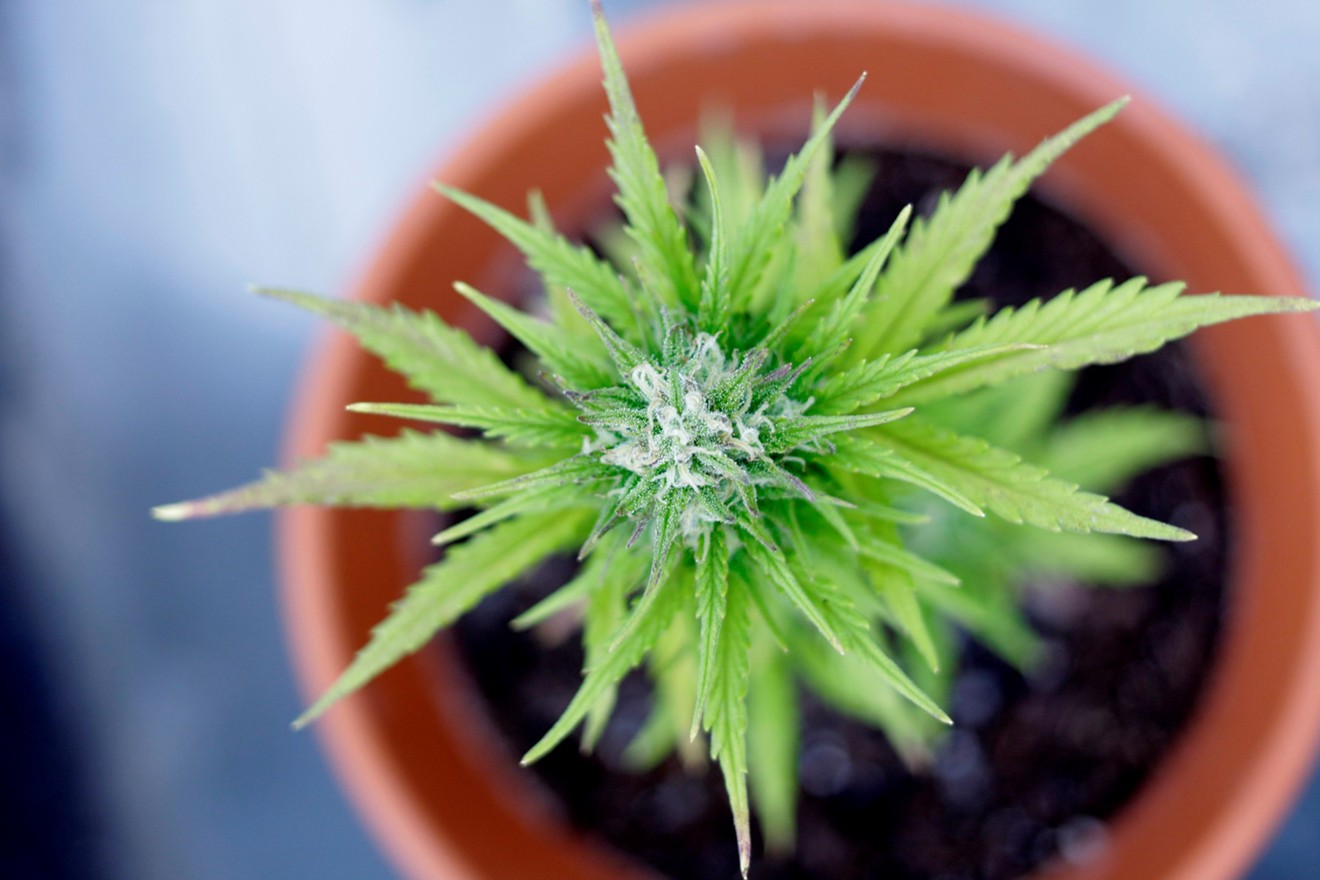Ahead of that vote, cannabis advocates and critics alike have their eyes on the Legislature — which has the power not only to change current marijuana laws and make new ones over the next few months, but to refer possible laws to the ballot for voters to decide, as one outside group has proposed.
Arizona Attorney General Mark Brnovich has said he hopes lawmakers will consider legalizing adult-use marijuana on their own terms, rather than through the ballot initiative this fall. He prefers that, he told Capitol Media Services last July, because it gives them more flexibility to make changes, whereas a law passed by ballot initiative requires a supermajority in both houses to amend.
Some lawmakers are following his logic. At least two bills to legalize adult-use marijuana are in the works this session from Democratic Representatives Randall Friese and Isela Blanc, they each confirmed to Phoenix New Times this week.
That said, passing adult-use marijuana through the Legislature won't be easy. Several Republican state House and Senate leaders have long stood in opposition to expanding access to cannabis beyond medical patients. Governor Doug Ducey has also said he doesn't support legalizing marijuana for all adults.
Arizona's cannabis industry is on its toes waiting to see what moves the Legislature will make this year. But the slate of bills already introduced, plus inside information from lawmakers, offer a glimpse at what's to come:
Introduced Bills
When the legislative session kicked off on Monday, several state House and Senate members on both sides of the aisle had already introduced bills dealing with Arizona's current marijuana laws. One bill, HB 2049, sponsored by Democratic Representatives Diego Espinoza and Lorenzo Sierra, would add autism spectrum disorder and opioid use disorder as qualifying conditions for medical marijuana.
Espinoza, a lawmaker from Tolleson, has said the proposed law was in response to some parents who wanted to give their autistic children medical marijuana as an alternative treatment to prescription drugs. But as New Times reported in December, there's a lack of empirical evidence showing such treatment is effective.
Another bill, HB 2178, sponsored by Democratic Representatives Isela Blanc, Kirsten Engel, and Diego Rodriguez, would require law agencies in the state to expunge and erase all criminal records related to marijuana possession arrests.
On the Republican side, Senate Majority Whip Sonny Borrelli has introduced a slew of bills to add oversight to the existing medical marijuana industry, from cultivation to the point of sale.
The Lake Havasu City lawmaker's SB 1015 would ban the use of all pesticides in marijuana products besides the natural products already deemed safe enough to be exempt from federal regulation — ingredients like cinnamon, lemongrass oil, and sesame.
His SB 1016 would require marijuana dispensaries to pay the state's 5 percent transaction privilege tax.
Borrelli also introduced SB 1010, which would allow the Arizona Department of Health Services to inspect marijuana dispensary kitchens without notice, and SB 1017, which would require DHS to share information about medical marijuana dispensaries with the Department of Revenue upon request.
In the Pipeline
The legislative session has only just begun, but lawmakers could see their first bill to legalize adult-use marijuana before this week is over, according to Democratic Representative Randall Friese.He said he's putting the finishing touches on the draft language of a bill he's worked on for months, which he says he prefers to the industry's ballot initiative, the Smart and Safe Arizona Act.
"As soon as the initiative language came out, I thought, 'I wouldn't do it that way,'" he told New Times. "I believe a bill is the best way to do this ... so we have the flexibility to change these regulations as this business grows."
Friese's bill would organize the adult-use marijuana industry differently than the Smart and Safe proposal would. It separates the medical and recreational industries, putting recreational sales into the hands of the state liquor board. It also does away with the industry's idea of vertically integrated licenses, and instead would issue separate licenses for cultivation, warehouse, and retail sales.
Friese said he'd like to see cannabis for recreational use sold in standalone liquor stores, rather than in the same dispensaries where medical marijuana is sold.
"A series 9 liquor license holder can apply for a marijuana liquor license to sell retail, but they must, within their liquor store, create a closed space," he said. "And you must be 21 to enter that area."
Instead of determining the number of dispensary licenses based on the number of pharmacies in the state, like the industry initiative, Friese's bill would take a population-based approach to allow for more sale locations. Over five years, he said, the bill would allow the liquor department to issue up to 500 licenses to sell cannabis.
His bill would treat cannabis like alcohol in other ways, too, banning both public consumption and traveling with an open container. It wouldn't allow consumers to grow their own flower at home — at least not yet, Friese said.
"The idea is to get us into this space in a comfortable way. A lot of people are comfortable with it, a lot of people aren’t. Home grow is prohibited in this first draft, with the expectation that if we have the flexibility as we do with a bill, that we can layer it on."
Instead of distributing funds from the program to multiple causes, Friese would funnel the first $300 million in profits per year to the School Facilities Board, which he said needs a large chunk of funding to repair infrastructure and get back to where it was before the recession hit.
Asked whether he thinks it's unrealistic that a bill to legalize marijuana would pass in a Republican-led legislature and with a Republican governor, he said it's worth a try.
"What I think is unrealistic is the attitude of, 'I’m not even going to consider this,'" Friese said. "We are legislators. We are not here to legislate our personal values. We are here to legislate the values that the state wants. Well, there are plenty of Arizonans who are consumers. And it’s their values. So this is an issue that the state should deal with."
If it didn't pass as a bill, Friese could also introduce his text as a referendum in hopes of getting enough legislative support for it to appear on the ballot in November.
Democratic Representative Isela Blanc of Tempe confirmed she's also planning her own bill to legalize cannabis, but couldn't provide details when asked on Tuesday.
Meanwhile, if Democratic Representative Pamela Powers Hannley of Tucson gets her way, a change the Legislature made last year digitizing medical marijuana cards could soon be reversed.
She told New Times she's heard complaints from constituents and dispensaries who say the digital medical marijuana cards are harder to use than the printed ones DHS used to issue. She's working on a bill to restore that option for patients.
"If it ain’t broke, don’t fix it," Powers Hannley said. "I think that patients should at least have the choice to have the plastic card and not have the electronic card."
DHS advises that patients can print out a copy of the digital medical marijuana card to carry with them if they prefer a physical card.
To Be Determined ...
The Arizona Cannabis Chamber of Commerce announced big plans last fall to work with the State Legislature to get its own proposal on the ballot in November.As of Tuesday, according to board member Mason Cave, the group has been tweaking its measure with feedback from legislators, but still hasn't locked down a sponsor.
"Over the Christmas holiday, everything shut down," he said. "We're just ramping up now that the session started. We’re hoping maybe we’ll make some headway in the next week or two."











